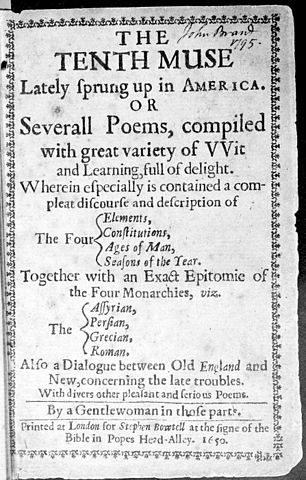Anne Bradstreet
In ascribing her uprooting to North America as the will of God, Bradstreet shows her loyalty to the Puritanism that infused her life, her family, her writings, and the mission of the Massachusetts Bay Company. The Puritan colonists who founded the Massachusetts Bay Colony were eager to create a world apart, what John Winthrop, the first governor of the colony called “a city upon a hill” in a sermon he gave to the assembled colonists on the Arbella as they arrived. The Massachusetts Bay Colony was a Puritan enclave run more as a theocracy than as representative democracy. The colony was officially intolerant of other religious denominations, and the colonists were eager to “civilize” the native peoples of the area (including members of the Massachusetts tribe, from which the Company and Colony took its name) by converting them to Christianity. (The Company’s seal, reproduced here, depicts, incredibly, a native American asking for such help.)
![The corporate seal of the Massachusetts Bay Company, founded in 1629. [Wikimedia Commons]](http://virginia-anthology.org/wp-content/uploads/2016/05/Mass_Bay_Company_seal_1629.png)
Theatrum Poetarum (1675), an enormous book that compiled the names of all of the significant poets, ancient and modern, Edward Philips identified precisely these long political poems as the ones by which “Anne Broadstreet, a New-England Poetess,” would be remembered. Her poem “A Dialogue between Old and New England” is an explicitly political work, lamenting the crisis that befell the home country in the 1640s and hoping that the godliness of its colonial offspring might help refresh it. Even on the frontier, Bradstreet kept engaged with the world beyond New England through her reading and her poetry, which addressed public and private subjects alike.
